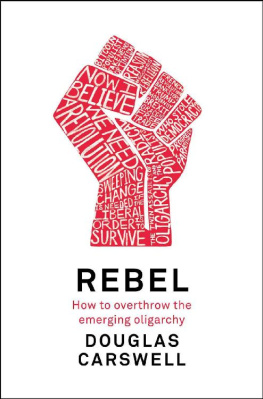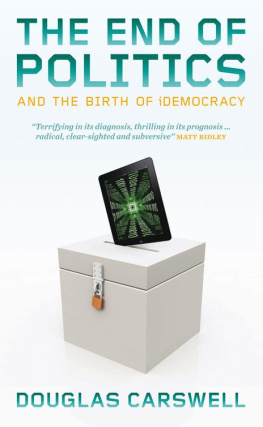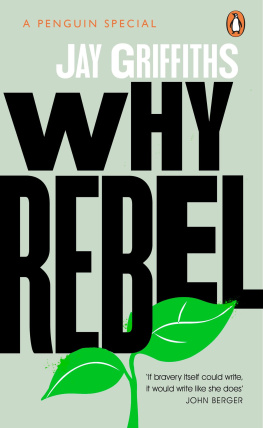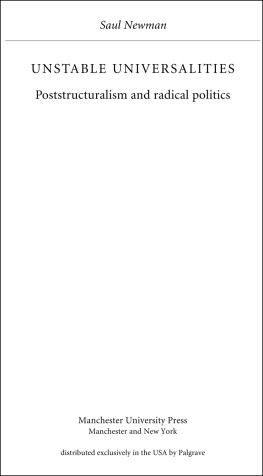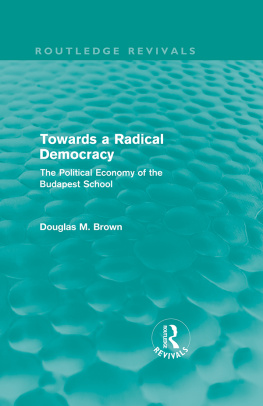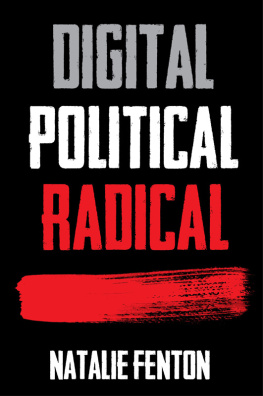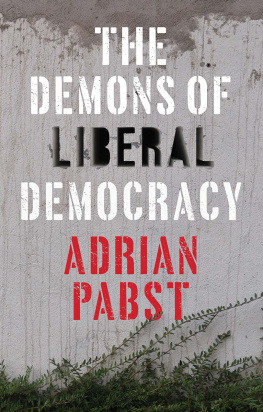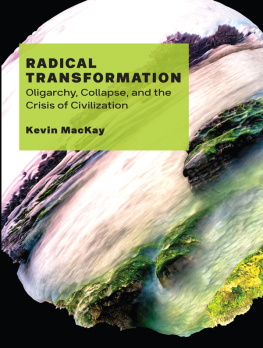REBEL
How to overthrow the emerging oligarchy
Douglas Carswell
www.headofzeus.com

Politics has never been more unpredictable. Radical populists and insurgents are turning politics-as-usual on its head. Rebel explores how we got here, where we are heading and what we can do about it.
Douglas Carswell argues that these insurgencies are a reaction against the emergence of a new elite oligarchy that has subverted our democracy and stifled our market system. Politics, he writes, is a cartel. Like the economy, it is rigged in the interests of an emerging oligarchy.
Our liberal, democratic order which Carswell shows is the mechanism that has allowed a historically unprecedented proportion of humanity to flourish now faces a twin assault: oligarchic elites on the one hand, radical populists on the other.
A major reassessment of history and politics, Rebel puts forward a bold new thesis: we are not the first to face such a threat. Oligarchic elites have emerged in previous societies in the past, often triggering insurgent protests. But all too often such insurgents played straight into the hands of the oligarchs: the Roman, Venetian and Dutch republics all succumbed to cartels. Anti-oligarch radicals, the author notes, have often made the oligarchs seem the more attractive option. So, too, today.
Carswell mounts a robust defence of the liberal order. Drawing on his first-hand experience in taking on and beating the established political parties, he proposes a series of sweeping changes to politics and capitalism to free us from the cartels, listing the practical steps needed to make this revolutionary change happen.
To Clementine and Kitty
Contents
Heres to the crazy ones. The misfits. The rebels. The troublemakers. The round pegs in the square holes. The ones who see things differently. Theyre not fond of rules. And they have no respect for the status quo. You can quote them, disagree with them, glorify or vilify them. About the only thing you cant do is ignore them. Because they change things. They push the human race forward. And while some may see them as the crazy ones, we see genius. Because the people who are crazy enough to think they can change the world are the ones who do.
S TEVE J OBS
When I first stood for election to Parliament, I believed that all we needed were the right kind of ministers, pursuing the right sort of plans. Now I believe we need a revolution.
Politics, I have come to see, is a cartel. Like the economy, its rigged in the interests of an emerging oligarchy.
I wrote this book because I care deeply about the liberal order that has allowed us to flourish as it has others before us. And also because I believe political pundits have failed utterly to comprehend the problem. Indeed, they are part of it.
We face a twin assault; oligarchs on the one hand, radical populists emerging in response to them on the other. Sweeping change is needed if the liberal order is to survive.
D OUGLAS C ARSWELL
Clacton, 13 February 2017

POWER AND THE NEW OLIGARCHY

THE RISE OF THE NEW RADICALS
Something extraordinary is happening to politics. A mood of populist revolt is taking hold. Across Britain, the United States and much of Europe, a new radicalism is on the rise.
Angry, insurgent voices, which would not even have found an audience a generation ago, can be heard. Indeed, these insurgents are starting to dominate the political debate everywhere from Slovakia to Sweden, California to Clacton. We can see the symptoms of this rising restlessness across the political spectrum, from Jeremy Corbyns Labour Party in Britain or the uber-leftist Podemos in Spain to the rise of the right-wing Alternative fr Deutschland (AfD) in Germany.
In the United States, the reality TV show host and property billionaire Donald Trump was elected president. He launched his bid to lead the party of Lincoln and Reagan by declaring that most Mexicans living in America were criminals, rapists and murderers. Less than a year later, he began his first few days in office with attacks not only Mexicans, but Hollywood actors, federal judges and anyone who seemed to question the size of his inauguration crowd.
Bernie Sanders came close to beating Trumps rival Hillary Clinton for the Democrat nomination in the US using the kind of overtly socialist language that had not been the currency of American politics since the Great Depression eighty years before. For much of the twentieth century, political debate in America took place within a narrow spectrum of political possibility. Both major parties subscribed to free-market capitalism under a modicum of state supervision, with a strong focus on individual liberty.
Yes, there were differences of tone and emphasis. Occasionally candidates for the White House took diverging views over foreign policy. But there was a recognizable set of boundaries within which the debate took place. Not anymore. Sanders implies that he wants to nationalize the banks, while Trump spoke of rounding up and deporting eleven million migrants, and imprisoning his opponents. The established consensus is starting to collapse in many Western states.
For decades, the political middle ground in Sweden was just about as far removed as it is possible to be from that in America. While US candidates vied with each other to keep taxes low and government small, in Sweden most politicians agreed on the need for cradle-to-grave welfare provision and high taxes to pay for it all. Swedish politics was so sensible and consensual, one of their major parties was the Moderate Party the Moderata samlingspartiet committed to, well, moderation.
But then along came the Sweden Democrats Sverigedemokraterna. Founded relatively recently, like many of the insurgent parties, they are fiercely anti-immigrant and in favour of economic intervention. Think of them as a Scandinavian blend of both Trump and Sanders. And like Trump and Sanders, these new insurgents have started to outpoll many of their tamer rivals. Its been a strikingly similar story across most of Europe. Insurgents and upstarts are on the rise almost everywhere on the far left and the radical right.
In Greece, the ultra-leftist Syriza (founded 2004) won two General Elections in 2015, with an overtly redistributionist agenda (albeit that the redistribution they most seem to favour is from Germany to Greece). Spains neo-Marxist Podemos (founded 2014) are now the countrys second largest party. Italys Five Star Movement Movimento 5 Stelle (founded 2009) won over a hundred deputies and fifty senate seats just four years later, and by mid-2016 was, according to some polls, the single most popular party in Italy.
In Denmarks 2015 elections, the Danish Peoples Party (foun-ded 1995) won 21 per cent of the vote. In Hungary, Jobbik (founded 2003) recently gained 20 per cent. The Swiss Peoples Party got 29 per cent. Geert Wilders of the radical Partij voor de Vrijheid (founded in 2005) may well be the next Dutch Prime Minister. In Britain, UKIP (a relative old-timer for an insurgent party, having been founded in 1993) won almost four million votes at the last General Election, displacing the Liberal Democrats as the third party.
People and parties outside the limits of what was once deemed to be the acceptable political order are on the rise. The old order is starting to fall apart. Why? What is going on?

